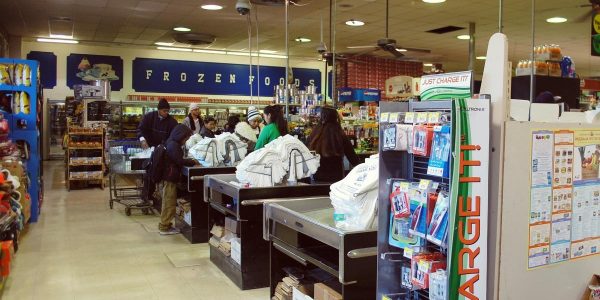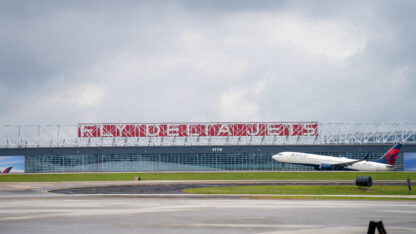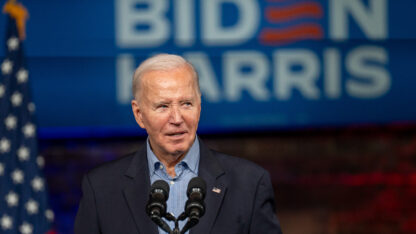How Refugees Helped A Struggling Ga. Grocery Store Succeed

The Clarkston Thriftown was struggling when Bill Mehlinger bought it 25 years ago. He turned things around by catering to the town’s growing refugee population.
STEPHANNIE STOKES / WABE
When Bill Mehlinger bought the Clarkston Thriftown in 1990, he would have described it as your typical American grocery store. The small, 10-aisle supermarket built in the 70s was well-stocked with things like Hamburger Helper, Jif Peanut Butter and Campbell’s soup.
Mehlinger had just come from a long career with the grocery chain Winn-Dixie. This was the kind of food he figured would sell.
But it didn’t.
“Sales started going down,” Mehlinger said, “and then they kept getting worse and worse.”
Within three years, the store’s sales had dropped by a third.
“We were trying everything we could think of,” Mehlinger said. “We were just trying to run it like a Winn-Dixie and it just wasn’t working.”

That’s because Clarkston was changing. Between 1980 and 1990, the city lost half of its white population, and more were leaving. The town was designated as a resettlement site for refugees. Many of the first were Vietnamese.
“We knew there were a lot of refugees in the neighborhood,” Mehlinger recalled. “None of them were shopping with us.”
With his business on the brink, Mehlinger realized he had to change that. He started driving out to Asian stores on Buford Highway.
Mehlinger said he would “just would walk around the store and try to see what they were putting in their buggies, and I’d grab it and put in my buggy, bring it back here and try to sell it.”
That sort of worked. After he hired a Vietnamese cashier, she showed him the food items she knew her community wanted. Soon her friends and family began shopping there.
Mehlinger then tried to stock foods specific to other refugees, like those who came to Clarkston from Bosnia and Croatia in the 1990s. And a few years later, things began turning around.
“We were getting a good refugee business,” Mehlinger said. “We still had a fairly decent American base, and we finally started making a little profit, which was none too soon.”

Now, the walls of the Clarkston Thriftown serve over a dozen nationalities. In one corner, you’ll find Indian yogurt. In another, West African cooking oil. Much of it, Mehlinger said, they have to pick up or even visit several places to find.
It makes a difference to the people whether from Congo, Iraq or Bhutan who end up in Clarkston — a city they don’t know — without a car.
“It’s very convenient for them to come to one store and then get everything they need in the same place,” said Jinny Sian, who works at Thriftown. “So [Mehlinger] adjusted to that and, you know, he makes sure he’s got everything what they need.”
If Mehlinger doesn’t, the employees, who are almost all refugees now, let him know. Sian once suggested some Burmese snacks that her family, from Myanmar, likes to eat. And he stocked them, she said.
“It just give you a sense of security like knowing that, you know, like there’s people that are willing to change for your countries and change their way of business,” Sian said.

J.D. McCrary is the executive director of the International Rescue Committee in Atlanta, a resettlement agency. He said, from providing individualized help for non-English speaking customers to cashing new arrivals’ checks, Mehlinger has succeeded in making Thriftown a comfortable place for Clarkston’s refugees.
And with recent anxiety about the arrival of refugees in local communities, McCrary said Mehlinger’s story is a reminder of the benefits of embracing diversity.
“Instead of packing up shop and selling out like a lot of other businesses did, they made the decision that they wanted to reinvest in their community,” McCrary said.
This willingness to change isn’t entirely unique to Thriftown, according to Peter Larkin, president and CEO of the National Grocers Association. It’s how independent grocers manage to hold onto a quarter of retail grocery sales nationally, he said.
“They have the ability to understand who is coming in and out of their store everyday, and are able to adapt and reflect, you know, their customer base,” Larkin said. “I think the Thriftown example is a perfect example of how that happens in communities throughout the United States.”
This flexibility, Larkin said, gives small supermarkets an edge over larger chain stores. It’s true for Mehlinger; competition from Kroger, Publix and Walmart doesn’t affect him.
Serving a refugee community, though, does require a special level of change. The people Mehlinger originally geared his store to — Vietnamese and Bosnians — have mostly moved out of Clarkston. Others have taken their place.
“We just had a huge influx of people from Burma and Nepal, and I’m told the next is going to be from Syria,” Mehlinger said. “And the refugee agencies are letting us know when this is happening and what we need to have. So we should be prepared when that happens.”
Mehlinger said the challenge of meeting a changing community’s needs keeps things interesting. Now, at 62 years old, he suspects he’ll be up to the task for at least another five years.








